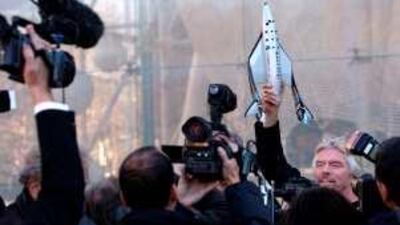Abu Dhabi // A space tourism company is in "advanced discussions" with parties in the UAE over building a spaceport in Dubai or Abu Dhabi. Virgin Galactic, owned by the British billionaire Sir Richard Branson, is planning to open a Middle-Eastern spaceport as one of a network of three or four permanent facilities around the world from which civilians can embark on sub-orbital space flights.
Stephen Attenborough, commercial director of the company, said the final location for the regional centre was yet to be decided and discussions were also under way with parties in countries including Bahrain, Qatar and Saudi Arabia. "We'd really like one of the spaceports to be in the Middle East and that's why we are starting serious discussions, and actually quite advanced discussions, with the UAE and other Gulf governments and investor groups," he said. An announcement on the location would probably come before the autumn and operational flights within the next five years was "not an unreasonable prediction", he said.
Tickets cost $200,000 (Dh734,600) for a Virgin Galactic flight that promises to take passengers to the edge of space where views stretch about 1,600km. They will be weightless for about six minutes. The spacecraft, attached to a mother ship, flies around 15,000m before separating and being blasted to 110,000m, about 10 times as high as a commercial jetliner flies. Prices are expected to drop as flights become more frequent.
More than 250 people have booked with Virgin, which is testing the new sub-orbital planes. Construction has begun at its first permanent spaceport, in New Mexico, from which Virgin hopes to launch flights by the end of next year. High interest from the Gulf region has cemented the company's plans for a spaceport here. "We note from the activity that we've had in the Middle East there are a lot of people who live in the region who would love to take this trip, have the means to do so, and would probably prefer to do it from somewhere reasonably local," said Mr Attenborough. The maiden charter flight on Virgin Galactic was recently sold to a Dubai company.
The spaceport would be a "stylish" destination where passengers would have three days of pre-flight training, and it would work well near an established tourism centre. "If it's near a great destination where people are going to want to come and stay and spend time, then that works well for us." A rival space tourism operator, Space Adventures, announced plans to build a spaceport in Ras al Khaimah in 2006, but the project has stalled.
"Although it has not been ruled out, we are no longer actively pursuing a spaceport location in Ras al Khaimah," the company said. "Space Adventures remains committed to bring spaceflight opportunities to the Middle East. We are currently considering various sites in the region, including the UAE, and meeting with potential partners. We will provide an update to our progress with this initiative at the appropriate time."
Tourism is only a fraction of the potential use of a regional spaceport, with other potential uses at least as big, according to Mr Attenborough. The facility could be used for scientific research, atmospheric sampling, earth observation or microgravity research, he said. Virgin Galactic vehicles could also potentially be adapted to launch small satellites into space "at a fraction of the cost and many times the reliability and frequency" of current systems, he said.
A consortium of Emirati and international companies recently announced that they plan to spend $800 million on an Earth imaging centre in Abu Dhabi that will launch four satellites by 2013. It will also offer education and training services in co-operation with some higher-education institutions. Mr Attenborough said Virgin Galactic's technology could dovetail with the ambitions of countries such as the UAE in scientific research. The emirate's first non-communications satellite, DubaiSat-1, is likely to launch in the next few months.
"There are some very exciting things happening in the UAE and other countries in the region, particularly in relation to science and education, and they can see a very clear link between what this system has to offer and what they are trying to achieve in the longer term," he said. lmorris@thenational.ae

